人教版高中英语必修5Unit 1 Great scientists Grammar课件(28张ppt)
文档属性
| 名称 | 人教版高中英语必修5Unit 1 Great scientists Grammar课件(28张ppt) |  | |
| 格式 | zip | ||
| 文件大小 | 2.1MB | ||
| 资源类型 | 教案 | ||
| 版本资源 | 人教版(新课程标准) | ||
| 科目 | 英语 | ||
| 更新时间 | 2020-07-07 16:15:16 | ||
图片预览


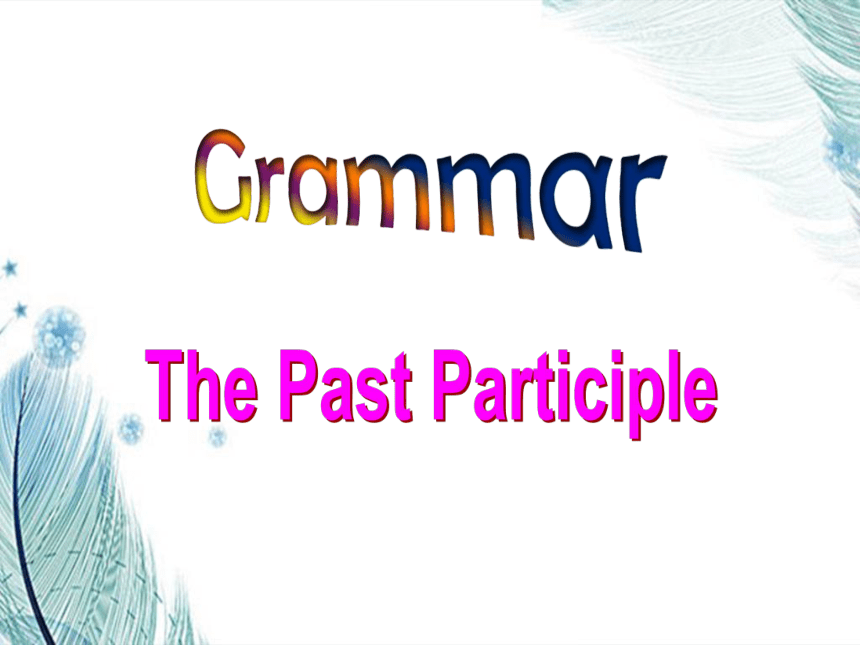

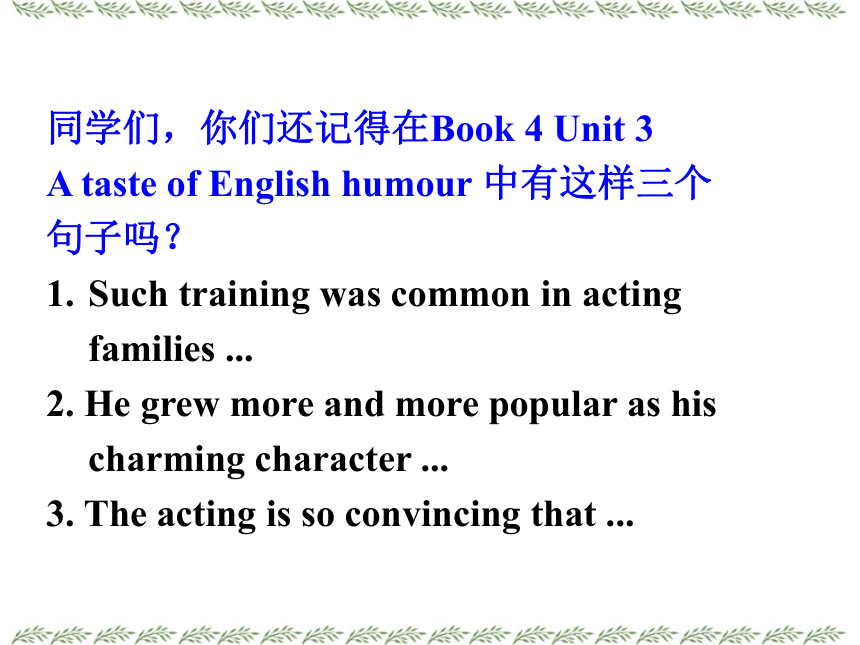

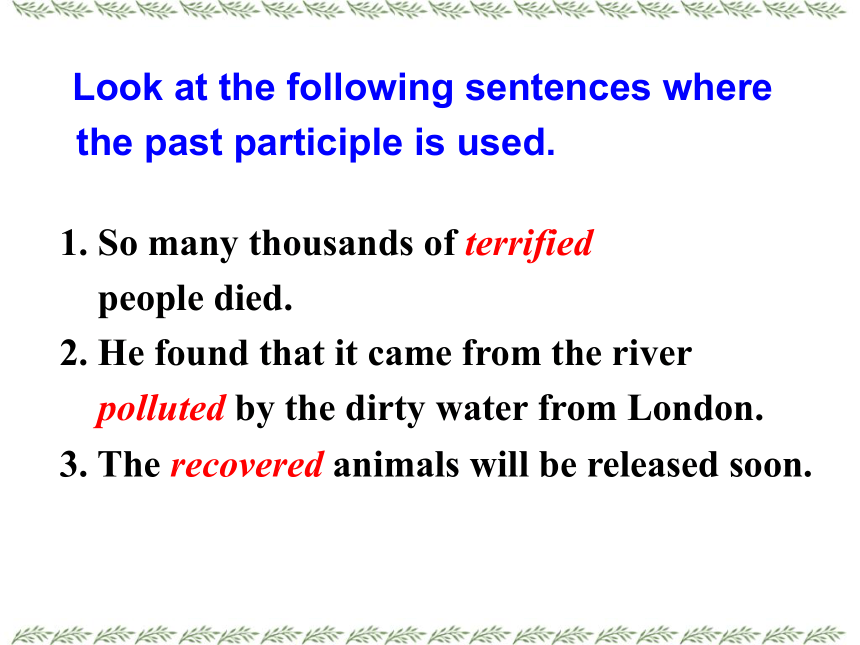
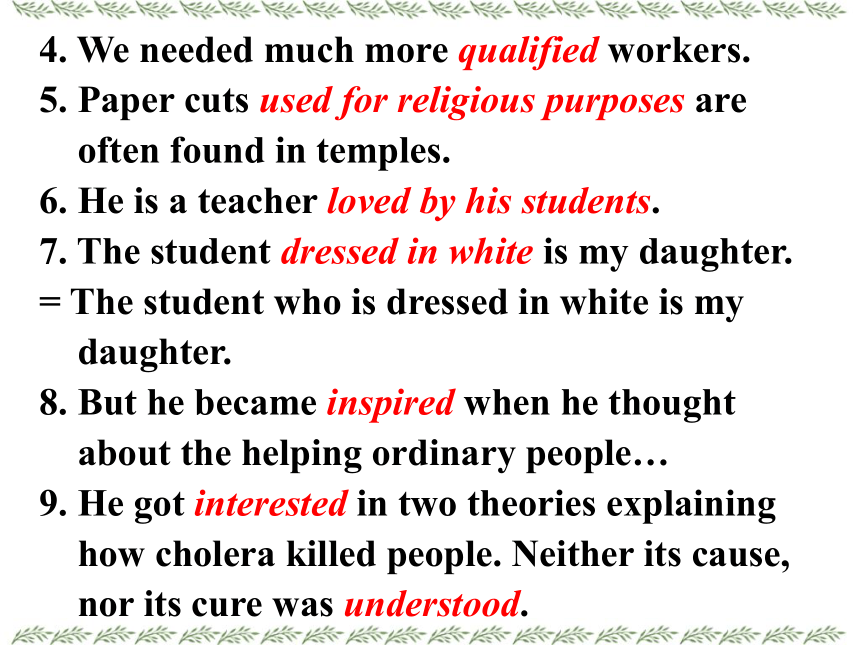
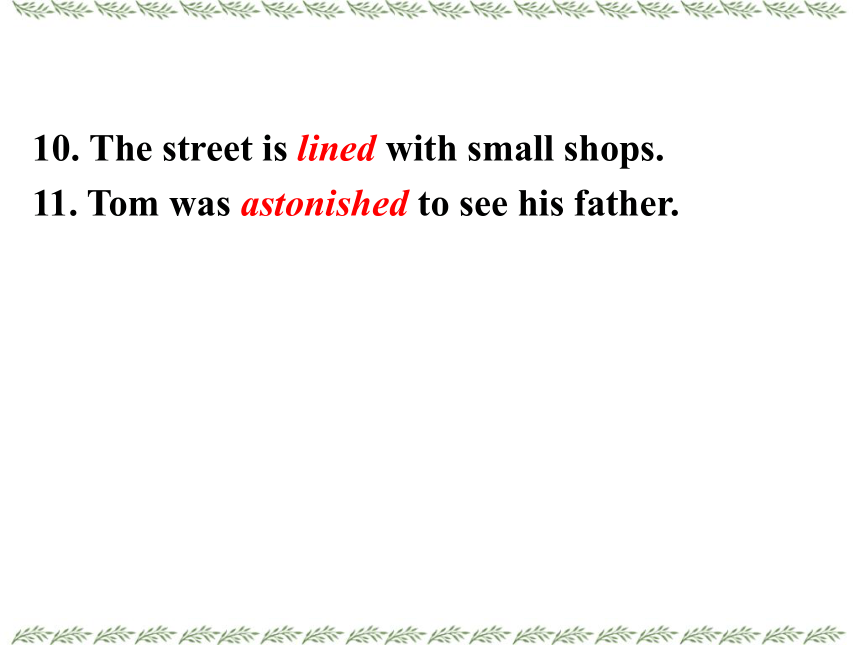
文档简介
(共30张PPT)
人教课标
高二
必修
5
Unit
1
1.
To
learn
the
use
of
the
past
participle
as
the
attribute
and
predicative
2.
To
use
the
past
participle
as
the
attribute
and
predicative
correctly
同学们,你们还记得在Book
4
Unit
3
A
taste
of
English
humour
中有这样三个
句子吗?
Such
training
was
common
in
acting
families
...
2.
He
grew
more
and
more
popular
as
his
charming
character
...
3.
The
acting
is
so
convincing
that
...
通过观察,我们不难发现第1、2句是动词-ing形式作定语,且放在被修饰的名词前面;第3句是动词-ing形式作表语,放在be动词的后面。今天我们要学习与动词-ing形式相对应的过去分词作定语和表语的用法。
Look
at
the
following
sentences
where
the
past
participle
is
used.
1.
So
many
thousands
of
terrified
people
died.
2.
He
found
that
it
came
from
the
river
polluted
by
the
dirty
water
from
London.
3.
The
recovered
animals
will
be
released
soon.
4.
We
needed
much
more
qualified
workers.
5.
Paper
cuts
used
for
religious
purposes
are
often
found
in
temples.
6.
He
is
a
teacher
loved
by
his
students.
7.
The
student
dressed
in
white
is
my
daughter.
=
The
student
who
is
dressed
in
white
is
my
daughter.
8.
But
he
became
inspired
when
he
thought
about
the
helping
ordinary
people…
9.
He
got
interested
in
two
theories
explaining
how
cholera
killed
people.
Neither
its
cause,
nor
its
cure
was
understood.
10.
The
street
is
lined
with
small
shops.
11.
Tom
was
astonished
to
see
his
father.
过去分词作定语:
1.
过去分词作定语时,表示的动作在谓语动作之前发生,已经完成并具有被动意义。此时,作定语的过去分词一般是由及物动词变来的,因为只有此类动词才有被动意义。
2.
单个的过去分词作定语一般放在被修饰的名词之前。过去分词短语作定语要放在被修饰的名词后面,作后置定语,表示被动或完成,其作用相当于一个定语从句。
【拓展】
1.
不及物动词的过去分词也可作定语,一般
作前置定语,不表示被动意义,只强调动
作完成。如:fallen
leaves落叶;retired
workers退休工人;the
risen
sun升起的太
阳。
2.
如果被修饰的词是由every
/
some
/
any
/
no
+
thing
/
body
/
one所构成的复合代词或指
示代词those或these等时,即使是单一的过
去分词作定语,也要放在被修饰词的后
面。
过去分词作表语:
过去分词作表语时,与谓语动词构成系表结
构,表示主语的性质、特征和状态。
可以用作表语的常见的过去分词有:
delighted,
disappointed,
upset,
astonished,
excited,
frightened,
experienced,
interested,
qualified,
puzzled,
exhausted,
satisfied。
【辨析】
1.
过去分词作表语时与被动语态的区别:过去分词作表语,主要是表示主语的状态和特征,
而被动语态则表示动作。如:
The
cup
was
broken
by
my
little
sister
yesterday.
The
library
is
now
closed.
2.
过去分词作表语与动词-ing形式作表语的区别:过去分词作表语表示被动或完成,动词-ing形式作表语表示主动或进行。如:
She
was
embarrassed
because
she
didn’t
know
the
answer.
Today’s
meeting
was
boring.
people
terrified
of
(cholera)
2.
seats
reserved
by…
3.
water
polluted
by…
4.
a
room
crowded
with…
5.
a
winner
pleased
with…
Complete
the
table
with
phrases
that
have
the
same
meaning.
Past
Participle
as
the
Attribute
(1)
Past
Participle
as
the
Attribute
(2)
1.
terrified
people
2.
reserved
seats
3.
polluted
water
4.
a
crowded
room
5.
a
pleased
winner
6.
astonished
children
7.
a
broken
vase
8.
a
closed
door
9.
the
tired
audience
10.
a
trapped
animal
Past
Participle
as
the
Attribute
(1)
Past
Participle
as
the
Attribute
(2)
6.
children
astonished
at/by
…
7.
a
vase
broken
by…
8.
a
door
closed
by…
9.
the
audience
tired
of
…
10.
an
animal
trapped
in/by
…
1.
He
got
______________
about
losing
the
money.
2.
The
painter
looked
so
_____
after
working
for
a
whole
day.
blamed
/
upset
tired
Complete
the
sentences
using
the
past
participle
as
the
predicative.
4.
Everybody
was
_________________
to
hear
of
the
death
of
the
famous
film
star.
shocked/
depressed
3.
I
was
___________
with
the
film
I
saw
last
night.
I
had
expected
it
to
be
better.
disappointed
5.
Everybody
is
really
_______
about
the
new
Olympic
stadiums.
6.
His
wound
became
_______
with
a
new
virus.
excited
infected
1.(2018天津3月)There
have
been
many
advances
in
medicine
in
recent
years.
That
means
money
_______
(use)
for
medical
research
has
been
well
spent.
used
2.
Jim
has
retired,
but
he
still
remembers
the
happy
time
_______
(spend)
with
his
students.
(2017北京)
spent
1.
过去分词作定语与所修饰的词之间有两种关系:从时间上讲,表示动作已经完成;从语态上讲,表示被动的概念。
2.
过去分词作表语,表示主语的特点或所处的状态。
Ⅰ.
用所给单词的正确形式填空。
1.
I
found
myself
in
an
____________
(embarrass)
situation
last
night.
2.
The
thief
tried
to
open
the
________
(lock)
box.
3.
The
________
(expect)
event
didn’t
occur.
4.?The
________
(injure)
woman
was
sent
to
hospital
quickly.
embarrassing
locked
expected
injured?
5.
We
need
a(n)
________
(balance)
diet
in
order
to
keep
fit.
6.
The
dragon
was
a(n)
________
(terrify)
sight
for
the
villagers.
The
________
(terrify)
villagers
ran
for
their
lives.
balanced
terrifying
terrified
Ⅱ.
用括号内动词的正确形式填空。
More
than
5,000
years
ago,
a
man
set
out
on
a
journey
into
the
Alps.
In
these
mountains
the
weather
can
change
in
a
matter
of
moments.
The
man
was
caught
in
a
snowstorm
and
died
there.
In
1991
his
body,
well
1.
________
(preserve)
by
a
glacier,
was
found
by
hikers,
preserved
who
realised
at
once
that
this
was
no
ordinary
skier
lost
in
an
avalanche
(雪崩)?—?he
had
a
grass
cloak
(斗篷)
and
a
copper
axe
(铜斧头).
People
got
2.
________
(interest)
in
this
man
and
he
became
an
internationally
famous
person?—?unable
to
speak,
but
with
a(n)
3.
________
(amaze)
story
to
tell.
It
was
established
that
the
4.
________
(freeze)
man
was
a
staggering
5,300
years
old.
interested?
amazing
frozen
The
equipment
5.
________
(carry)
by
him
proved
that
the
transition
from
the
Neolithic
(新石器时代的)
to
the
Copper
Age
had
happened
much
earlier
than
previously
thought.
The
man
was
named
Oetzi
after
the
region
of
the
Alps
where
he
had
been
found.
The
man
was
about
45
when
he
died,
and
may
have
been
a
shepherd
6.
________
(look)
after
his
sheep.
carried
looking
Finish
the
exercises
1,
2
on
page
43.
人教课标
高二
必修
5
Unit
1
1.
To
learn
the
use
of
the
past
participle
as
the
attribute
and
predicative
2.
To
use
the
past
participle
as
the
attribute
and
predicative
correctly
同学们,你们还记得在Book
4
Unit
3
A
taste
of
English
humour
中有这样三个
句子吗?
Such
training
was
common
in
acting
families
...
2.
He
grew
more
and
more
popular
as
his
charming
character
...
3.
The
acting
is
so
convincing
that
...
通过观察,我们不难发现第1、2句是动词-ing形式作定语,且放在被修饰的名词前面;第3句是动词-ing形式作表语,放在be动词的后面。今天我们要学习与动词-ing形式相对应的过去分词作定语和表语的用法。
Look
at
the
following
sentences
where
the
past
participle
is
used.
1.
So
many
thousands
of
terrified
people
died.
2.
He
found
that
it
came
from
the
river
polluted
by
the
dirty
water
from
London.
3.
The
recovered
animals
will
be
released
soon.
4.
We
needed
much
more
qualified
workers.
5.
Paper
cuts
used
for
religious
purposes
are
often
found
in
temples.
6.
He
is
a
teacher
loved
by
his
students.
7.
The
student
dressed
in
white
is
my
daughter.
=
The
student
who
is
dressed
in
white
is
my
daughter.
8.
But
he
became
inspired
when
he
thought
about
the
helping
ordinary
people…
9.
He
got
interested
in
two
theories
explaining
how
cholera
killed
people.
Neither
its
cause,
nor
its
cure
was
understood.
10.
The
street
is
lined
with
small
shops.
11.
Tom
was
astonished
to
see
his
father.
过去分词作定语:
1.
过去分词作定语时,表示的动作在谓语动作之前发生,已经完成并具有被动意义。此时,作定语的过去分词一般是由及物动词变来的,因为只有此类动词才有被动意义。
2.
单个的过去分词作定语一般放在被修饰的名词之前。过去分词短语作定语要放在被修饰的名词后面,作后置定语,表示被动或完成,其作用相当于一个定语从句。
【拓展】
1.
不及物动词的过去分词也可作定语,一般
作前置定语,不表示被动意义,只强调动
作完成。如:fallen
leaves落叶;retired
workers退休工人;the
risen
sun升起的太
阳。
2.
如果被修饰的词是由every
/
some
/
any
/
no
+
thing
/
body
/
one所构成的复合代词或指
示代词those或these等时,即使是单一的过
去分词作定语,也要放在被修饰词的后
面。
过去分词作表语:
过去分词作表语时,与谓语动词构成系表结
构,表示主语的性质、特征和状态。
可以用作表语的常见的过去分词有:
delighted,
disappointed,
upset,
astonished,
excited,
frightened,
experienced,
interested,
qualified,
puzzled,
exhausted,
satisfied。
【辨析】
1.
过去分词作表语时与被动语态的区别:过去分词作表语,主要是表示主语的状态和特征,
而被动语态则表示动作。如:
The
cup
was
broken
by
my
little
sister
yesterday.
The
library
is
now
closed.
2.
过去分词作表语与动词-ing形式作表语的区别:过去分词作表语表示被动或完成,动词-ing形式作表语表示主动或进行。如:
She
was
embarrassed
because
she
didn’t
know
the
answer.
Today’s
meeting
was
boring.
people
terrified
of
(cholera)
2.
seats
reserved
by…
3.
water
polluted
by…
4.
a
room
crowded
with…
5.
a
winner
pleased
with…
Complete
the
table
with
phrases
that
have
the
same
meaning.
Past
Participle
as
the
Attribute
(1)
Past
Participle
as
the
Attribute
(2)
1.
terrified
people
2.
reserved
seats
3.
polluted
water
4.
a
crowded
room
5.
a
pleased
winner
6.
astonished
children
7.
a
broken
vase
8.
a
closed
door
9.
the
tired
audience
10.
a
trapped
animal
Past
Participle
as
the
Attribute
(1)
Past
Participle
as
the
Attribute
(2)
6.
children
astonished
at/by
…
7.
a
vase
broken
by…
8.
a
door
closed
by…
9.
the
audience
tired
of
…
10.
an
animal
trapped
in/by
…
1.
He
got
______________
about
losing
the
money.
2.
The
painter
looked
so
_____
after
working
for
a
whole
day.
blamed
/
upset
tired
Complete
the
sentences
using
the
past
participle
as
the
predicative.
4.
Everybody
was
_________________
to
hear
of
the
death
of
the
famous
film
star.
shocked/
depressed
3.
I
was
___________
with
the
film
I
saw
last
night.
I
had
expected
it
to
be
better.
disappointed
5.
Everybody
is
really
_______
about
the
new
Olympic
stadiums.
6.
His
wound
became
_______
with
a
new
virus.
excited
infected
1.(2018天津3月)There
have
been
many
advances
in
medicine
in
recent
years.
That
means
money
_______
(use)
for
medical
research
has
been
well
spent.
used
2.
Jim
has
retired,
but
he
still
remembers
the
happy
time
_______
(spend)
with
his
students.
(2017北京)
spent
1.
过去分词作定语与所修饰的词之间有两种关系:从时间上讲,表示动作已经完成;从语态上讲,表示被动的概念。
2.
过去分词作表语,表示主语的特点或所处的状态。
Ⅰ.
用所给单词的正确形式填空。
1.
I
found
myself
in
an
____________
(embarrass)
situation
last
night.
2.
The
thief
tried
to
open
the
________
(lock)
box.
3.
The
________
(expect)
event
didn’t
occur.
4.?The
________
(injure)
woman
was
sent
to
hospital
quickly.
embarrassing
locked
expected
injured?
5.
We
need
a(n)
________
(balance)
diet
in
order
to
keep
fit.
6.
The
dragon
was
a(n)
________
(terrify)
sight
for
the
villagers.
The
________
(terrify)
villagers
ran
for
their
lives.
balanced
terrifying
terrified
Ⅱ.
用括号内动词的正确形式填空。
More
than
5,000
years
ago,
a
man
set
out
on
a
journey
into
the
Alps.
In
these
mountains
the
weather
can
change
in
a
matter
of
moments.
The
man
was
caught
in
a
snowstorm
and
died
there.
In
1991
his
body,
well
1.
________
(preserve)
by
a
glacier,
was
found
by
hikers,
preserved
who
realised
at
once
that
this
was
no
ordinary
skier
lost
in
an
avalanche
(雪崩)?—?he
had
a
grass
cloak
(斗篷)
and
a
copper
axe
(铜斧头).
People
got
2.
________
(interest)
in
this
man
and
he
became
an
internationally
famous
person?—?unable
to
speak,
but
with
a(n)
3.
________
(amaze)
story
to
tell.
It
was
established
that
the
4.
________
(freeze)
man
was
a
staggering
5,300
years
old.
interested?
amazing
frozen
The
equipment
5.
________
(carry)
by
him
proved
that
the
transition
from
the
Neolithic
(新石器时代的)
to
the
Copper
Age
had
happened
much
earlier
than
previously
thought.
The
man
was
named
Oetzi
after
the
region
of
the
Alps
where
he
had
been
found.
The
man
was
about
45
when
he
died,
and
may
have
been
a
shepherd
6.
________
(look)
after
his
sheep.
carried
looking
Finish
the
exercises
1,
2
on
page
43.
